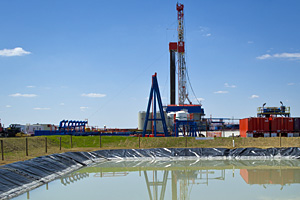
The US is now the world’s largest oil producer, according to estimates from Bank of America.
This is all down to fracking, which has hugely boosted energy production in the US. As fracking has taken off, shares in companies that are directly involved have done very well.
For example, Chesapeake Energy (NYSE:CHK) is up 20% over the past year, while Devon Energy (NYSE: DVN) has jumped 36%.
However, the firms that find and extract the oil aren’t the only ones who stand to make a lot of money. The firms who sell services to the energy companies should also do well. This is especially true for companies that are trying to resolve some of the challenges the fracking industry still faces.
What are the challenges?
You might think the risk of earthquakes is one of those challenges. Remember that after three earthquakes in Blackpool in 2011, all further fracking activity was suspended for nearly a year.
However, the ban was later lifted after studies showed that it was safe. Indeed, one expert at the University of Durham has estimated that the seismic impact of fracking is the same as someone falling off a ladder.
However, concerns about water supplies have a firmer foundation. Fracking can produce a lot of waste and this is a real challenge for the industry. Waste can include everything from chemicals used in the fracking process, to radioactive material from deep underneath the ground.
The good news is that proper disposal methods can eliminate virtually all of this risk. The problem is that properly disposing of large amounts of wastewater can be difficult and expensive. That’s because you need to dig dedicated disposal wells that are separate from the main water supply. So regulation is very important here – to make sure that fracking companies do dispose of wastewater safely.
In response to mounting political pressure, regulators in several American states are taking an increasingly tough line. California recently shut down a number of discharge wells and pledged to review over 100 others. Even states normally sympathetic to the industry are following suit. According to Brian O’Connell of research firm Prosdocimi, the time taken to get a permit for a disposal well in Texas has increased from around a month to between 12 and 18 months.
Thirsty process
A related problem is that, even if the waste is disposed of properly, fracking still requires a lot of water. With swathes of the US experiencing droughts, this is a contentious issue.
In fact, it’s estimated that around half the US counties in which fracking-related activity takes place are experiencing some form of drought.
Not only does this push up costs, it’s a powerful argument for those opposed to fracking. No politician wants to be responsible for farmers going bust or for restrictions on homeowners’ lawns and pools. Indeed, the amount of water consumed is a key part of the case made by opponents of fracking in California.
This isn’t just an American problem, of course. Plans to develop fracking in China have repeatedly come up against the fact that most of China’s shale oil and gas lies in areas plagued by water shortages. In one notorious case, drilling in one area ended up accidentally cutting off an entire city’s water supply.
Water recycling
As a result, the industry is searching for technology that enables the oil companies to re-use waste water. With the cost of conventional solutions rising, this makes sense from an economic and public relations perspective. At the same time, state governments in shale oil and gas states are also trying to speed adoption by cutting the red tape for fracking firms who use such systems.
While several firms are working on recycling systems, one small company is currently in the lead. The Canadian listed Aqua-Pure Ventures (TSE: AQE) has developed two systems: ROVER, and a more advanced system called NOMAD. These collect the wastewater and filter out the harmful chemicals and sludge. This allows the purified water to be reused or safely discharged into the normal water supply. Either way, the main benefit is less net usage of water and less waste.
Aqua-Pure has a small market cap of $11.9m and is currently making a loss, so it’s not for the fainthearted. However, it has several partnerships with fracking companies, including Devon Energy. It also has a joint venture with shale services company Select Energy. These partnerships should cut the risk for Aqua-Pure while it rolls out its technology.
Prosdocimi estimates that revenue will double this year from C$6.1m to C$13.6m. The company could start making a consistent profit later this year.
If you want to find out more about the pros and cons of fracking as well as some other ways you could make money, check out our latest fracking video.
• This article is taken from our free daily investment email, Money Morning. Sign up to Money Morning here.
Our recommended articles for today
The 12 investments our experts would buy into now
How might renewables change the face of energy? And where should investors look for profits? Our Roundtable of experts pick the stocks to buy now.
Should you worry when a CEO leaves without reason?
SUBSCRIBERS ONLY
When a company chief executive leaves for no apparent reason, it’s always a good idea for investors to ask themselves why, says David Thornton.
On this day in history
25 July 1959: First hovercraft crosses the English Channel
This day in 1959 saw the first hovercraft cross the English Channel. By 1968, regular services were taking passengers and cars across in 35 minutes.